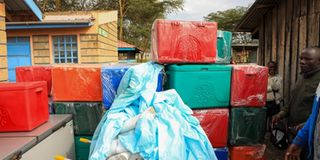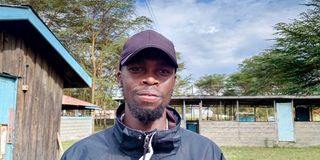Mixed bag of fortunes for fishermen at Lake Naivasha

Cooler boxes distributed to the Central Beach Management Unit on November 21, 2024.
Lake Naivasha may not have any fish in the future due to overfishing and increased human activities caused by the growing population in the area, county agriculture director Leonard Bor has warned.
Mr Bor made the remarks during the 2023 World Fisheries Day celebrations held at Central Beach, under the theme "Collaborative Governance for Blue Transformation and Sustainable Investment in Fisheries".

Agriculture CECM Leonard Bor addressing the public during the World Fisheries Day on November 21, 2024.
Lake Naivasha, a major freshwater lake in Nakuru County, plays a crucial role in supporting large-scale economic activities such as fishing.
These activities create employment opportunities for many and also benefit various stakeholders in the fish value chain.
"Collaboration with fishing communities, government agencies and stakeholders is critical to enforce fisheries management measures and ensure the long-term sustainability of Lake Naivasha fisheries," he says.
In 2023, the lake produced 1,140 tonnes of fish valued at Sh147,429,048. More than 800 fishermen depend directly on the lake, with a further 10,000 people indirectly involved in the fish value chain.
Paul Olwenyi, the chairperson of the Beach Management Unit (BMU), highlights the lake's significant potential to support young people and create employment opportunities.

Cooler boxes distributed to the Central Beach Management Unit on November 21, 2024.
However, he is concerned about the practice of catching undersized fish, which hinders the regeneration of fish stocks and results to lower market prices.
"By removing undersized fish from the lake, you deny them the chance to replenish the stock, resulting in lower yields and prices. It's an issue that needs to be addressed urgently," Mr Olwenyi says.
Fish poaching is also a major challenge, he says, as it contributes to insecurity and hinders the sustainable growth of fisheries.
He advocates interventions such as value addition in aquaculture to reduce pressure on the lake.

Kelvin Ereng poses for a photo on November 21, 2024.
For Kelvin Ereng, a coxswain, the lake supports not only fishermen but also young people involved in eco-tourism.
These activities include boat rides and cycling at the landing beaches.
To support the fishing community, the county government distributed 600 fishing nets to fishermen at Central Landing Beach and provided fish processing equipment, including coolers, knives, rubber boots and wheelbarrows, to the BMU to improve the operation of the fish market.
In addition, two youth groups were provided with eco-tourism boats in a bid to grow the blue economy.


